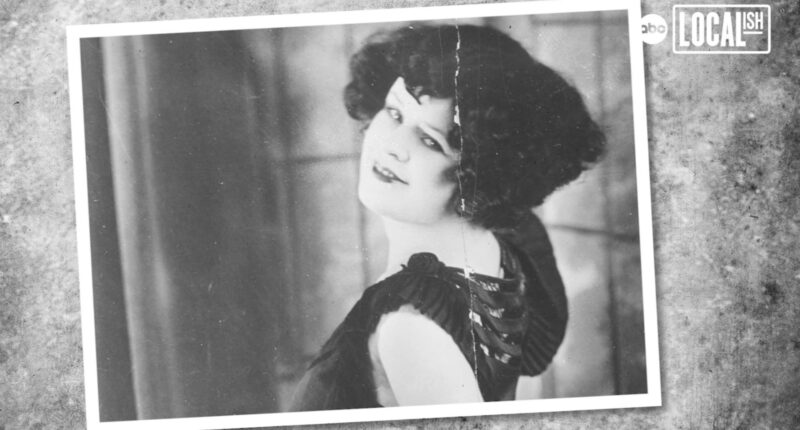Share this @internewscast.com
NEW YORK — Vivian Gordon, often referred to as the Broadway Butterfly, aspired to fame on the stage but instead became embroiled in a political scandal. Her involvement contributed to the downfall of New York Mayor Jimmy Walker’s career and the collapse of the Tammany Hall political machine. This entanglement likely cost her her life.
For a figure so well known in her day, she spent almost a century resting in an unmarked grave far from the city lights she craved.
This was until author Anthony M. DeStefano began researching for his book, “Broadway Butterfly: Vivian Gordon: The Lady Gangster of Jazz Age New York.” During his research, he discovered that she had been largely forgotten, lying in an unmarked grave at Mount Hope Cemetery in Hastings-on-Hudson, located in New York’s Westchester County.
Now, a polished headstone stands where Benita Bischoff, better known as Vivian Gordon, rests. DeStefano, who financed the marker personally, states that he felt it necessary because Gordon is not only a significant historical figure in New York City’s history but also a murder victim. He believed providing her with a proper marker was the right thing to do.
Gordon grew up in Indiana, where she dropped out of Catholic school before running off to get married, a union that produced a daughter. She worked as a chorus girl and had her sights set on Broadway. Gordon left her husband and fled to New York with her daughter in 1920.
The move turned out to be a tough transition.
DeStefano says many performers like Gordon needed side hustles to make ends meet – they were known as Broadway Butterflies, drawn like butterflies are to lights, in their case, those of the Great White Way.
“Not all the women who were Broadway Butterflies were able to make it as regular employment, so they would be attracted to other lines of work.”
For Gordon, it was prostitution and sexual-extortion schemes. She was eventually arrested and sentenced to women’s prison. Vivian believed her estranged husband colluded with police to arrest her on trumped-up charges.
DeStefano thinks being incarcerated was a turning point for Gordon because “she became schooled in – sort of – the dark arts of women criminals.” The conviction cost Gordon custody of her daughter, Benita.
After her release, Gordon picked up where she had left off, now working within powerful political and government circles. DeStefano says she ran with some of New York’s most notorious gangsters.
People like, “Polly Adler, Legs Diamond, Arnold Rothstein – famous because of the Black Sox scandal. There were guys that were bootleggers like Charlie Higgins,” he said.
DeStefano says an emboldened Gordon was being pulled deeper into an underworld of crime around the time she was set to testify as a witness in a police corruption trial.
On Feb. 26, 1932, Gordon’s strangled corpse was found in Van Cortlandt Park in the Bronx. The murder attracted international attention — and the rapt notice of City Hall and then Gov. Franklin D. Roosevelt.
The crime led to another bombshell when police searched Gordon’s apartment. DeStefano says investigators “found a diary which had some of her male clients.” But the 300 or so men named in the diary were largely unaffected, and Harry Stein, a known criminal and associate of Gordon’s who was indicted for her murder, eventually beat the wrap. Gordon’s murder has never been solved.
Then on March 4 of that year, Gordon’s daughter Benita, motherless and overwhelmed by the case, killed herself.
As violence and corruption dominated newspaper headlines, Roosevelt, religious leaders and a growing segment of concerned New Yorkers denounced such immoral developments. The ensuing scandals, investigations and fallout resulted in Walker leaving office (and his wife) before moving to Europe with his girlfriend. Tammany Hall’s influence also began waning in a disillusioned New York City.
Gordon’s murder in a way helped push New York City toward a new future. A future DeStefano thinks might’ve been kinder to someone like Gordon.
“People say she was talented. Had she lived today, there may have been more opportunity for her. Maybe make it in Broadway some way. Maybe make it in the theater. Maybe make it in television. Everyone was vying for a shot on Broadway. All the butterflies were circling around the bright lights and many of them got burned,” DeStefano said.
With executive producer Rolando Pujol
If you are experiencing suicidal, substance use or other mental health crises please call or text the new three-digit code at 988. You will reach a trained crisis counselor for free, 24 hours a day, seven days a week. You can also go to 988lifeline.org.
















